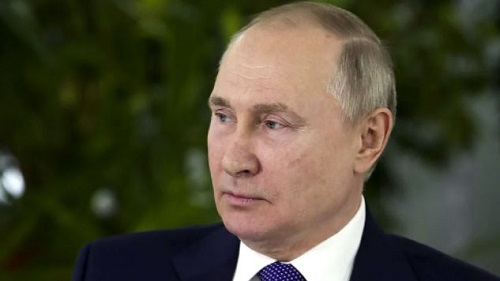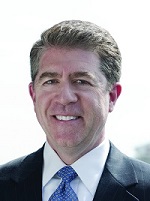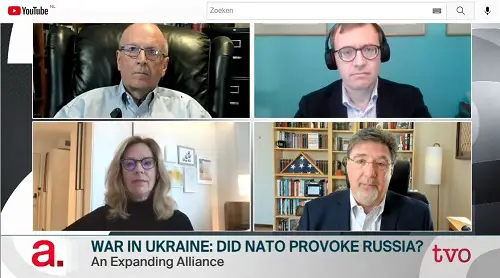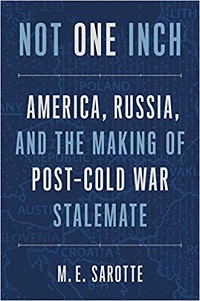|
TRANSLATE THIS ARTICLE
Integral World: Exploring Theories of Everything
An independent forum for a critical discussion of the integral philosophy of Ken Wilber
  Frank Visser, graduated as a psychologist of culture and religion, founded IntegralWorld in 1997. He worked as production manager for various publishing houses and as service manager for various internet companies and lives in Amsterdam. Books: Ken Wilber: Thought as Passion (SUNY, 2003), and The Corona Conspiracy: Combatting Disinformation about the Coronavirus (Kindle, 2020). Frank Visser, graduated as a psychologist of culture and religion, founded IntegralWorld in 1997. He worked as production manager for various publishing houses and as service manager for various internet companies and lives in Amsterdam. Books: Ken Wilber: Thought as Passion (SUNY, 2003), and The Corona Conspiracy: Combatting Disinformation about the Coronavirus (Kindle, 2020). Part 6 | Part 7 | Part 8 | Part 9 | Part 10  ‘Putin has a Point and the West is to Blame’Confronting Contrarian Views of the Ukraine CrisisFrank VisserAbstract by ChatGPT. The article delves into the Ukraine crisis, questioning the West's responsibility. Frank Visser advocates for a balanced perspective, cautioning against extreme views. Joseph Dillard's essays suggest the West's NATO expansion, despite prior commitments to Russia, instigated the crisis. However, others highlight Putin's vision of a unified Russian-Ukrainian identity and Ukraine's democratic aspirations. The piece draws parallels between Hitler's actions and Putin's Ukraine invasion. A Canadian TV discussion reveals split opinions on the West's role, with some seeing NATO's growth as provocative, while others view Putin's moves as anti-democracy. The article underscores the need for understanding both geopolitical and democratic facets.
But taking Putin's own stated perspective of the war into account is one thing, going all the way into the rabbit hole of Russian war propaganda is totally something else, in my opinion.
Confronted with a diffuse or potential threat on the horizon—the coronavirus, global warming or Putin's invasion of Ukraine—denialism is one way to cope with it. Reversal also happens: the perceived threat is actually a blessing in disguise. Sickness is your body's road to health. Global warming and CO2 rising are actually good for nature. Putin's "special operation" is actually justified and restoring a balance in geopolitics. In my opinion, it takes a wide disregard for scientific and historical data to claim these opinions as deeper truth, as "what is really going on in the world." Conspiracy-minded people love this slogan. Even if the majority of humanity is brainwashed, duped or fast asleep, at least they are in the know! The opposite response to denialism is, of course, alarmism. The coronavirus will kill millions! Global warming will end human civilization! Russia is a clear and present danger to all European countries, that's why we need a strong NATO! Walking down a middle way seems to be the wisest move, both acknowledging real dangers and pacifying irrational fears. But that's rather difficult for us humans, as the corona pandemic has amply demonstrated. Only just recovering from this ordeal, we are presented with a next threat: a foreign and former super power invading a neighbouring country and threatening with nuclear weapons if NATO would stick out one finger. A multi-perspectival view of things Joseph Dillard In two long essays our Integral World author Joseph Dillard has presented such a contrarian (and conspirational?) view of the Ukraine war.[1] While he candidly concedes that most of the views we hold are often subjective and biased, and we only look for arguments to support our pre-conceived notions (including in his own case), he sees value in entertaining less popular views. But taking Putin's own stated perspective of the war into account is one thing, going all the way into the rabbit hole of Russian war propaganda is totally something else, in my opinion. Geopolitics not being my favorite subject, I have struggled with his arguments in the past weeks. Here are some of my reflections, most probably biased as well. The main thesis of Dillard's essays, if I understand them correctly, is: the West is responsible for the current crisis, because it recklessly expanded NATO even though promises were made to Russia in the past it would not move eastward "a single inch". Due to these security concerns Putin has now decided to "demilitarize" Ukraine, so that a neutral buffer state arises separating Russia from the rest of Europe. This is geopolitics 101, as voiced by the likes of John Mearsheimer. (It is debatable if this "promise" was really made, or if it was made in a different time, when young president Putin still showed (or pretended to have) democratic inclinations, but let's assume for now that this security issue as perceived by Russia is the main point of contention.) However, in his essay "How we got Putin so wrong", Stathis N. Kalyvas argues that geopolitical considerations should be supplemented by "leaders' preferences and peoples' demands".[2] In his speeches Putin clearly referred to his view that Russians, Ukrainians and Belarusians should be seen as one people, and Ukraine doesn't have a separate existence (thus legitimizating its annexation by Russia). (I have explored this in: "Putin's Dark Ideology of a Sacred Greater Russia".) Furthermore, the Ukrainian people has clearly clearly expressed its desire for freedom and democracy, which cannot be easily dismissed as irrelevant as a "coup" by the West. (See also my "Hubris and Hypocrisy Are Present On Both Sides"). As Kalyvas paraphrases Mearsheimer's views: "As for the Ukrainians, tough luck. In the hard world of great power politics, you can't possibly seek closer integration with the West if you happen to live on Russia's doorstep." These two important dimensions are overlooked by Mearsheimer and company. It is obvious that this is a complicated situation, both historically and geopolitically. But who would go as far as saying "Hitler had a point when he invaded Poland and the West was to blame?". Some actually go that far, pointing to the fact that Hitler decided to invade only after England had promised to defend Poland. Hitler was contemptuous of the "artificial" countries Poland and Czechoslovakia. Large German populations existed in these countries, and he used his "concern" for the wellfare of these German minorities as a justification to invade, as a pretext to demand territorial concessions. Chamberlain agreed with Hitler's take of Sudetenland, a German speaking part of Czechoslovakia, in the hope it would satisfy his territorial hunger, but it only turned out to be the start of a much larger and deadly invasion.[3] After all, Hitler wanted to build his Third Reich; this turned out to be his main agenda. Sounds familiar, yes? The parallel with the current Ukraine war is striking. Putin justified the recognition of the Donbas independent republics as a separate entity and their subsequent invasion by pointing to the wellfare of Russian speaking inhabitants. Should we "grant" these eastern territories to him, in the hope he would not go further? As recent developments have shown, he is not content to leave it with these areas, but want's to "demilitarize" and "denazify" all of Ukraine—with disastrous consequences both for Ukraine, Europe and his own country. As I wrote earlier, he dreams of a Eurasian "Sacred Greater Russia".[4] Was the Russia-threat to Europe real or imagined? Is the expansion of NATO a real or imagined threat for Russia? It is very hard to decide on the facts here. After all, feelings of insecurity (and security) can be very subjective.  Lincoln Bloomfield Jr. So is the West in any way to blame for the current crisis? Lincoln Bloomfield Jr. served as a national security official and assistant secretary of State in five administrations. In a recent article he answers this question decisively in the negative. Recalling a meeting with senior Russian officials around 2004, when seven(!) nearby countries had recently become NATO members, "there were no objections or red line warnings".[5] He drily comments: "If Putin felt the U.S. was disrespecting Russian interests, some of us directly involved never got the memo." But as soon as 2007, during a Munich security conference, Putin called NATO expansion "a serious provocation that reduces the level of mutual trust." Critiquing the US invasion in Iraq, he claimed that "the only mechanism that can make decisions about using military force as a last resort is the Charter of the United Nations … The use of force can only be considered legitimate if the decision is sanctioned by the UN.” Yet, Putin unilaterally invaded the country of Ukraine, of which he denies even the right to exist as an independent nation. So, 'Did NATO PROVOKE RUSSIA?'The question of Western "blame" was discussed recently on the Canadian television in "The Agenda with Steve Paikin" (see below for the full video).[6] Four experts from the field of political science or international affairs gave their considered opinion. The conversation goes back and forth between Yes and No—with very little consensus.
Participants in the "The Agenda with Steve Paikin" episode on Ukraine.
Tom Nichols argues the suggestion itself is "silly". NATO has gone out of its way not to antagonize Russia, he says. And Russia has continuously attacked or meddled with its neighbours, be it Georgia or Crimea. What really bothers Putin is "that 40 million Ukrainians are trying to practice democracy at his doorstep." Catherine Stoner adds that there was no real threat of Ukraine joining NATO any time soon, and that the real threat for Russia is having a Western-facing democracy in Ukraine, compared to the increasingly autocratic Russian government. In contrast, David Hendrickson argues that yes, "the West bears a tremendous amount of responsibility" as it put NATO membership at least on the table, sponsored the 2014 revolution, thereby handing over power to extremists. In his opinion, NATO membership became a "now you see it, now you don't" magic trick. Paul Robinson adds that "provoking is too strong a word", but "no decision is made absent of any context", and the decisions made by the West in the past 20-25 years have created a "paranoid atmosphere in Moscow" and "conditions in which this [invasion] seems to be a logical thing to do." 
Top: Hendrickson and Robinson, bottom: Stoner and Nichols.
In the second round of discussion, Nichols states that paranoia is not the creation of the West but due to a paranoid mafia boss in charge. While he was reluctant at first about NATO expansion, it was Putin who convinced him about its necessity for Europe. All attempts by NATO to accommodate Putin's wishes have been in vain because "you can't do business with a mafia don, who has decided he must stay in power at all costs and part of the way he does that is sparking wars at his borders." If provocation is too strong a word, has the West missed any diplomatic means, Stoner is asked. She feels that mistakes could have been made, but she firmly rejects the notion that the West "sponsored" the Maiden revolution in 2014 as "nonsense", because it gives no agency at all to the Ukrainian people. Hundreds of thousands of people protesting against a corrupt government cannot be genuine in this paranoid view. What provoked the revolt was the president refusing to sign a trade agreement with the EU. Hendrickson, when asked about the "broken promise" to Russia, comments "yes, this is a promise broken" but adds, that the Maiden revolt was just half a million people out of 44 million that were against a trade law. The moderator again raises the question: "if we had done something differently in the past, would Russia not have invaded? Should NATO look in the mirror?" Robinson emphasizes that the US government has supported Ukraine both during the Maiden revolt and the civil war in the Donbas, where the Ukrainian government was fighting its own people for eight years. This "anti-Maiden Russian spring" was also, in his opinion, an act of agency on the part of the Donbas population. Ukraine failed to implement the Minsk agreements and the West has done nothing to persuade Ukraine to settle this important matter. Leaving Russia no other way than to act, even if it was, for Robinson too, "an enormous over-reaction". Nichols, when asked to comment, furiously rejects the idea that the Maiden protests can in any way be compared to the January 6th revolt in the US, for Ukraine is a democracy-in-progress whereas the US has hundreds of years of democratic history. Promises of NATO membership should perhaps never have been made, he concedes, but all this does not justify the issue at hand of the invasion and destruction of a neighbouring democratic country. That is just a case of blaming the victim, for Nichols. 
Hendrickson adds (echoing Dillard) that no criticism of the US should be interpreted as justification for the war Putin has started, as "that's a way of shutting down all argument whatsoever." He further emphasizes that whatever we think of Crimea and the Donbas, these populations have a "different identity than the people in the West of Ukraine", did not want to be ruled by Kiev and preferred to live in the Russian sphere of influence. "That's a fact" (Nichols and Stoner vigorously shaking their heads now). He also stresses that a mass gathering of protesters is not the way to democratically change a government. Stoner adds that Putin is now returning to 19th century power politics squandering what has been achieved in the international political arena, and that Russia suffers from this as well now. She recommends the book Not One Inch by M.E. Sarotte as a good source about the no-NATO-expansion "promise". Stoner continues by saying that if it would be inappropriate for Russia to support Canadian truck drivers in their protest against their own government, it is equally inappropriate for Russia to meddle in the Donbas by sending anonymous soldiers to that area stoking up the conflict. Or having a referendum in Crimea in which the only options were "do you want to be part of Russia or independent?" (not even mentioning, "do you want to remain part of Ukraine?"). The moderator then brings up a quote from Stephen Walt, a representative of the American school of political realism, to the effect that "the US and European neglect of [geopolitical realities] is a major reason the world is in this mess today." Nichols, predictably, objects to this 19th century thinking, because it neglects that we have real countries with real people and real cultures, not just a billiard ball play of powerful forces. And, for example, it overlooks the real malign influence of the Russian-Orthodox patriarch who told Putin he can become a great Russian leader who will re-unite all orthodoxy. Culture matters as well here, next to power politics, he stresses. As does Putin's psychology as a real person. Going from generic geopolitical considerations to Russia levelling houses and hospitals is just "ridiculous" to him. If general geopolitics was so important for Putin, he would not be talking about Nazis. "This is paranoid, delusional talk!" Putin is, in fact, nostalgic for the old Soviet empire, and he has said so himself. He adds: these arguments that seemingly justify Putin's actions may not be pro-Putin, but they are always anti-NATO and "the facts on the ground at this moment in history don't support that argument." The moderator then brings up the US Monroe-doctrine, that said "don't mess in our backyard", to Robinson. Isn't Russia just having its own Monroe-doctrine now? To some extent it is, Robinson answers. He adds that geopolitical arguments don't neglect the cultural dimension, because Putin does act because of a perceived cultural link to Ukraine. What is more, "it is very dangerous to poke your fingers into something which somebody else considers their vital interest, for they will fight for it. And Ukraine not being a vital interest for the US, it will not fight for it [directly]." "A rather dangerous and irresponsible thing to do", he adds. "This should not be taken as excuses or taking a pro-Kremlin line", he stresses. The same could happen in the case of China and Taiwan, he warns. Asked for this opinion on this, Hendrickson replies: "Ukraine feels betrayed by both Russia and the West. Zelinsky goes around the world asking for support but gets a double message: we are with you and we are not." As to sanctions against Russia, he adds: "these sanctions are semi-permanent and will be a tremendous wealth-destroying instrument. China is now brought into this as well, because there are no neutrals according to the US. We need to think about the economic fallout. We haven't begun to think about these consequences." A more balanced approachThis continuous back-and-forth is extremely helpful and illuminating, at least to me. Even specialists in these matters of geopolitics can differ so widely as to their analysis of the current crisis. Sorry to say, I see merit on both sides of the argument. Briefly, there's the realistic approach that says "even if we don't agree with other super power's regimes or ideologies, it's best not to mess around with them." It sees all idealistic or ideological arguments as dressing for down-to-earth power politics. The more idealistic approach says, "that may be true, but we should not close our eyes on the real steps that are being made towards (or away from) democracy and freedom." Culture matters. Ideology matters. Modernity matters. Without idealism the realistic approach becomes cynical. Without realism the idealistic approach becomes hypocritical. Do we not need both? What is more, the complexity of the issue is such that we don't need to go into rabbit holes, Russian or Western, to try to find a reasonable way out of this mess. Following the daily news coverage of conventional and conspirational media, one gets sucked into the feeling that no explanation is reliable anymore and no facts ever get proven. Dillard argues that we should transcend our Western group-think to really understand what's going on at the moment, and we should resist every form of pre-rational black-and-white thinking: West = good; Putin = bad. Wish that Putin would follow the same advice, where he sees every Ukrainian who dares to liberate himself from the Russian sphere of influence as a Nazi—even if we grant Ukraine's Neo-Nazi problem. Given Russia's experience in World War II, for Dillard this "makes total sense." What about equally strong anti-Russian sentiments in Ukraine fuelled by decades of suffering from the days of Stalin onwards? Likewise, pretending to defend Russian speaking inhabitants in the Donbas who would have less freedom and protection when living in Russia, as Putin does, is hardly a credible argument for what is effectively a cultural genocide. So while I appreciate Dillard's efforts to point to lesser known arguments or Russia-friendly media sources, this is still far from a balanced approach. Dillard also makes the illuminating comment that we human beings are mostly not rational, but rationalizing animals, hiding our real motives and finding arguments that justify our (often unconscious) behavior—and, we can now conclude, this includes Vladimir Putin. In the end, the question "how did we get here" is interesting but academic, compared to the more burning question "how do we go from here?" You can view the full episode of "The Agenda with Steve Paikin" here (0:00-40:00):
Steve Paikin: "Is there an argument to be made here that the West provoked Russia in some way and shares some blame for the state of affairs today?"
BACKGROUND VIDEO MATERIALIn this video from "TLDR News EU" the views of realist John Maersheimer are evaluated.[7] Gist of the video: by taking Crimea Putin created the very result he did not want to happen: a Westernized Ukraine.
"We are going to argue that while there's space for debate about the appropriate division of blame pre-Crimea, post-Crimea Putin only has himself to blame."
And more to the point of our essay, this "TLDR News EU" video tackles: is Putin right about NATO expansion creating a security risk for him?[8]
"We're going to ask whether NATO actively expanded eastward, that is, whether the West and the us actively encouraged eastern European states to join NATO in an attempt to undermine Russia or whether those eastern European states were the primary agents in NATO enlargement."
Notes[1] Joseph Dillard, "Is Putin Red and the West Green?" and "The Ukraine Crisis: An Opportunity to Wake Up Out of Groupthink", www.integralworld.net, March 2022. [2] Stathis N. Kalyvas, "How we got Putin so wrong: Taking Putin at his word", iai.tv, March 1, 2022. [3] Timothy B. Lee, "75 years ago, Hitler invaded Poland. Here's how it happened", www.vox.com, Sep 1, 2014. [4] Frank Visser, "Putin's Dark Ideology of a Sacred Greater Russia", www.integralworld.net, April 2022. [5] Lincoln Bloomfield Jr., "The West is not to blame in Ukraine: Putin alone is wrong", thehill.com, March y25, 2022. [6] The Agenda with Steve Paikin, "Is the West to Blame for the Ukraine Crisis?", tvo.org, March 21, 2022. [7] TLDR News, "Is the West to Blame for Russia's Invasion?", YouTube, 27 feb. 2022. [8] TLDR News, "Is Putin Right About Nato's Eastward Expansion? ", YouTube, 11 mrt. 2022.
Comment Form is loading comments...
| ||||||||||